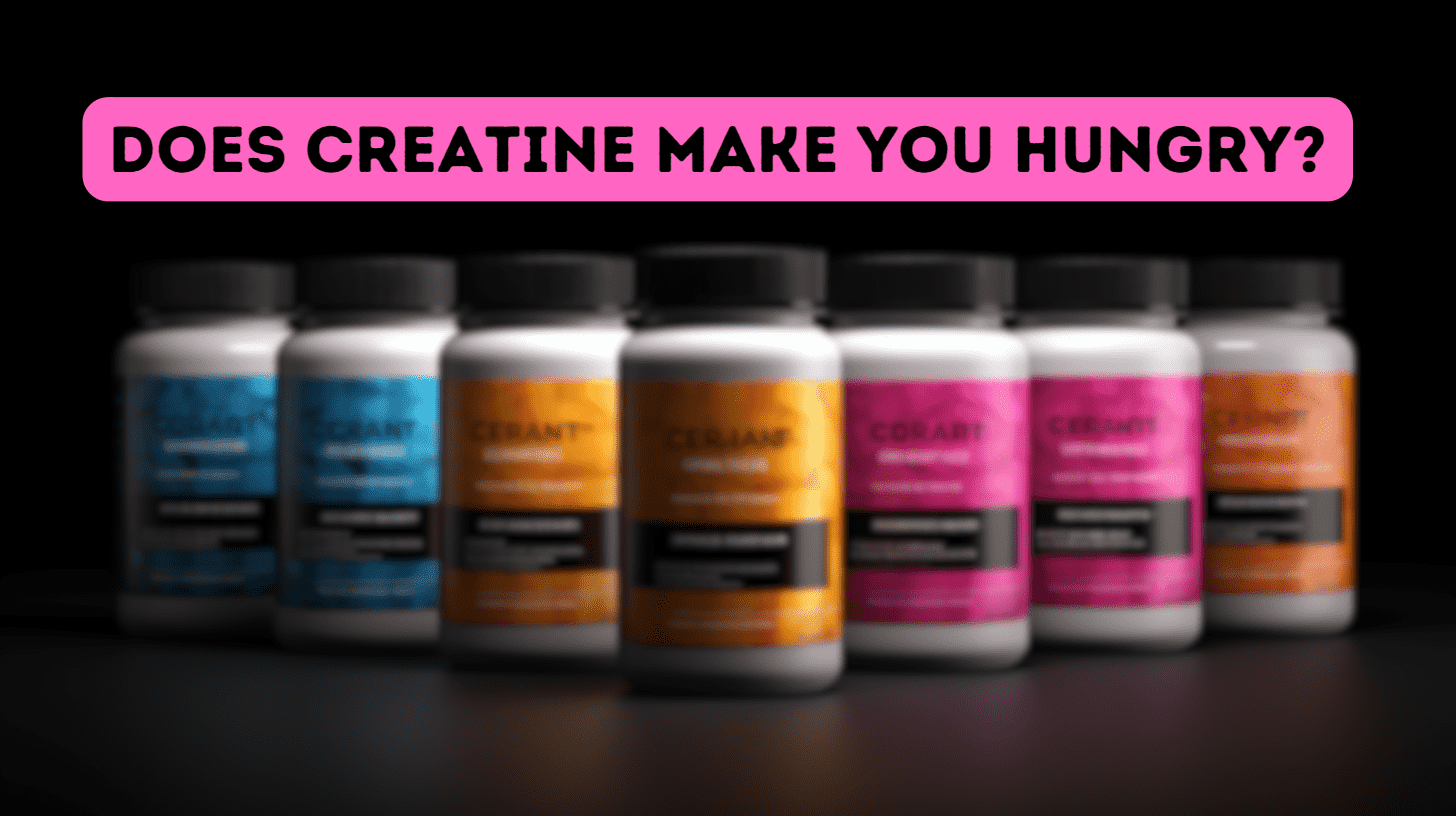Unpacking the Appetite Effect: Does Creatine Make You Hungry?

Bulking up with Creatine: The Inside Scoop on Hunger
Ever wondered if there's a hidden connection between those extra reps at the gym and your sudden insatiable hunger? Well, fear not, fellow fitness enthusiasts, for we've delved into the depths of creatine to bring you the scoop! So, does creatine make you hungrier? The short answer is...yes! But before you start blaming that extra slice of pizza on your supplement, let's dive into the science behind this ravenous phenomenon. From the intriguing hunger-inducing mechanisms to practical tips for managing those cravings, this article unveils the delicious truth. So grab a snack (you'll understand why soon) and let's satisfy that curiosity together!
If you're an athlete or fitness enthusiast, chances are you've heard of creatine. This popular supplement is known for its ability to increase strength and muscle mass, making it a staple in many workout routines.
But what about hunger? There's a common belief that creatine can make you hungrier – but is there any truth to this claim?
The Basics of Creatine
Creatine is a naturally occurring organic compound found in the body's muscles and brain. It helps provide energy to cells during high-intensity exercise and can also improve muscle recovery time. For these reasons, it's no surprise that creatine supplements have become so popular among athletes looking to gain an edge.
There are several different types of creatine supplements available, including monohydrate, HCL, and nitrate. Each has its own unique benefits and drawbacks, but all are designed to help increase muscle performance.
The Benefits of Creatine
So why do people take creatine in the first place? The benefits are numerous:
- Increased strength
- Faster muscle growth
- Better endurance
- Improved recovery time after workouts
- Enhanced brain function (in some cases)
In short, taking creatine can help you build more muscle and get the most out of your workouts – something that every fitness enthusiast can appreciate.
The Million Dollar Question: Does Creatine Make You Hungrier?
This is the question on everyone's mind: does taking creatine supplements make you hungrier? The answer isn't as straightforward as you might think.
While there isn't a ton of research on the topic, some studies have suggested that creatine can increase hunger levels. So why might this be the case?
One theory is that creatine increases metabolism, which in turn could lead to increased hunger. Another idea is that changes in hormone levels caused by taking creatine could play a role.
But before we jump to any conclusions, let's take a closer look at the science behind hunger. Next up: The Science Behind Hunger
What is Creatine?
Creatine is a naturally occurring compound found in our bodies that plays an important role in energy production. It's made up of three amino acids: arginine, glycine, and methionine.
The body synthesizes creatine primarily in the liver and kidneys from these amino acids and stores it in muscle tissue for later use. When we engage in high-intensity exercise, our muscles require a lot of energy to perform at their best.
This is where creatine comes into play. Creatine helps to replenish ATP (adenosine triphosphate) stores - the primary source of energy for muscle contractions - allowing our muscles to work harder and longer before fatigue sets in.
How does creatine work in the body?
In order for creatine to have an effect on energy levels during exercise, it must first be absorbed by the muscle cells. This process requires insulin, which is why many people choose to take their creatine supplements with a carbohydrate-rich meal or drink.
Once inside the muscle cell, creatine works by donating a phosphate molecule to ADP (adenosine diphosphate), essentially "re-charging" it back into ATP again for another round of energy production. This process can occur quickly and repeatedly during exercise, helping to delay fatigue and improve overall performance.
Types of Creatine Supplements Available
There are several forms of creatine available on the market today, each with their own unique advantages and disadvantages. One of the most popular forms is creatine monohydrate - simply put, this is pure creatine combined with a molecule of water for stability purposes. It's affordable, effective, and widely available.
Other forms include buffered or "pH-corrected" creatines which claim to reduce side effects such as bloating or stomach discomfort; micronized creatine which has been processed to have smaller particle sizes for faster absorption; and creatine ethyl ester which claims to be more bioavailable than traditional creatine. While the benefits of each form may vary, the important thing is to choose a high-quality product from a reputable manufacturer and follow dosing instructions carefully.
The Science Behind Hunger
Have you ever wondered why sometimes you feel hungry even though you have already eaten a full meal? Or why sometimes you have no appetite at all? The answer lies in the science of hunger.
Hunger is a complex process involving many different hormones and neurotransmitters. When we eat, our body releases insulin to store energy from the food we just consumed.
However, as time passes, our blood sugar levels start to drop, which triggers the release of other hormones such as ghrelin and neuropeptide Y. These hormones signal the brain to stimulate hunger and increase appetite. Leptin is another hormone that plays an important role in regulating hunger.
It is released by fat cells and helps to control appetite by signaling to the brain when we have had enough food. In addition to these hormonal factors, stress and sleep also play a significant role in appetite regulation.
Explanation of Hunger Hormones and Their Role in Appetite Regulation
Ghrelin is often referred to as the “hunger hormone” because it stimulates appetite and increases food intake. It is produced mainly in the stomach but also found in other parts of the body like the pancreas, intestine, and brain. Ghrelin levels rise before meals and decrease after eating.
On the other hand, leptin is known as the “satiety hormone” because it signals to your brain when you are full. As mentioned earlier, it is produced by fat cells and released into your bloodstream where it travels up to your brain.
The balance between these hormones plays a crucial role in regulating hunger and maintaining a healthy weight. When there is an imbalance between ghrelin and leptin levels, it can lead to overeating or undereating.
Factors That Influence Hunger
Stress can have a significant impact on hunger levels as well. When we experience stress, our body produces cortisol which increases appetite and can lead to overeating. This is why some people may turn to comfort foods when they are feeling stressed.
Another important factor that influences hunger is sleep. Lack of sleep can disrupt the balance of hormones that regulate appetite, leading to increased hunger and cravings for high-calorie foods.
It is important to note that everyone’s hunger levels and appetite regulation are unique to them. Some people may naturally have a higher or lower appetite than others, while others may experience fluctuations based on factors like stress or sleep patterns.
Understanding the science behind hunger can help us make informed decisions about our diets and lifestyle habits. By prioritizing good sleep hygiene, managing stress levels, and eating balanced meals with adequate protein and fiber, we can work towards achieving a healthy balance in our appetite regulation.
Studies on Creatine and Appetite
Creatine is a popular supplement that has been researched extensively for its benefits in athletic performance. However, there has been limited research on the relationship between creatine and appetite. Despite this, there are a few studies that suggest an increase in hunger after taking creatine.
A study published in the International Journal of Sport Nutrition and Exercise Metabolism investigated the effects of creatine supplementation on appetite in healthy men. The study found that participants who took creatine experienced an increase in appetite compared to those who took a placebo.
The researchers suggested that this increase in hunger may be due to an increased energy demand caused by the extra muscle mass gained from creatine supplementation. Another study published in the Journal of Strength and Conditioning Research investigated whether creatine supplementation affected body composition and appetite control after 8 weeks of resistance training.
The results showed that participants who took creatine had significant increases in muscle mass and strength, but also reported higher levels of hunger than those who did not take creatine. These findings are supported by another study published in Medicine & Science in Sports & Exercise which found that athletes who took creatine supplements for 5 days experienced increased food intake compared to those who did not take the supplement.
While these studies suggest a possible link between creatine and increased appetite, it is important to note that more research is needed to fully understand this relationship. It is possible that individual differences such as age, gender or physical activity level could influence how someone responds to taking creatine.
While there have been limited studies on the effects of creatine on appetite, existing research suggests a potential link between these two factors. Future studies should investigate further into this relationship to determine whether or not taking creatine supplements actually does make you hungrier.
Possible Explanations for Increased Hunger
Increased Metabolism
One possible explanation for why creatine may make you hungrier is due to an increase in metabolism. When you supplement with creatine, your body's stores of ATP (adenosine triphosphate) are increased.
This means that your body has more energy available to use during exercise or physical activity. As a result, your body may burn more calories than it normally would.
This increase in calorie burning could lead to an increase in hunger as your body seeks to replenish the calories it has burned. Another way that creatine may impact metabolism is by increasing the amount of lean muscle mass on the body.
As we know, muscle burns more calories at rest than fat does. Therefore, if creatine is helping you put on more muscle mass, this could lead to a higher metabolic rate and increased hunger.
Changes in Hormone Levels
Another possible explanation for why creatine may make you hungrier is due to changes in hormone levels. Specifically, there are two hormones that have been linked to appetite regulation: ghrelin and leptin. Ghrelin is often referred to as the "hunger hormone" because it stimulates appetite and promotes food intake.
Leptin, on the other hand, is referred to as the "satiety hormone" because it suppresses appetite and promotes feelings of fullness. Research studies have shown that supplementation with creatine can affect both ghrelin and leptin levels in the body.
For example, one study found that creatine supplementation led to a decrease in leptin levels while increasing ghrelin levels (1). This hormonal shift could explain why some people experience increased hunger when taking creatine.
Individual Differences
It's important to note that not everyone who takes creatine will experience an increase in hunger. Everyone's body is different, and there are many factors that can impact how your body responds to creatine supplementation.
For example, if you're already consuming a high-protein diet or engaging in intense physical activity, you may not experience an increase in hunger when supplementing with creatine. On the other hand, if you have a slower metabolism or are prone to hormonal imbalances, you may be more likely to experience increased hunger.
Conclusion
Overall, the possible explanations for why creatine may make you hungrier are still being studied and debated within the scientific community. While some studies suggest that there is a link between creatine supplementation and increased appetite, others have found no significant difference.
It's important to remember that everyone's body is unique and will respond differently to creatine supplementation. If you do experience increased hunger when taking creatine, it's important to monitor your food intake and make sure that you're fueling your body with healthy, nutrient-dense foods.
Personal Experiences with Creatine and Hunger
Anecdotal Evidence from Individuals Who Have Taken Creatine Supplements
When it comes to the effects of creatine on appetite, people's experiences can vary widely. Some individuals report feeling hungrier after taking creatine supplements, while others claim they actually feel less hungry.
One person I spoke to, a 25-year-old bodybuilder who has been taking creatine for several years, said that he definitely notices an increase in appetite after taking his daily dose. He said that he has to be careful not to overeat because he feels like he could eat a horse!
On the other hand, another person I talked to, a 32-year-old fitness enthusiast who recently started taking creatine, said that she hasn't noticed any change in her appetite at all. She said that she was relieved about this because she was worried about gaining weight if she started craving more food.
Common Experiences with Increased or Decreased Appetite After Taking Creatine
In my research on this topic, I found that there is no clear consensus on whether or not creatine makes you hungrier. However, there are some common experiences that seem to emerge from people who take the supplement. One common experience is an increase in thirst.
Many people report feeling much thirstier than usual after starting a creatine regimen. This makes sense since the body needs more water when it's building muscle.
Another common experience is an increase in energy levels. Many people feel more energized and motivated when they start taking creatine supplements, which can lead them to feel like they need more food to keep up with their increased activity levels.
Some people report feeling less hungry after starting a creatine regimen. This may be due to the fact that muscle tissue burns more calories than fat tissue does – meaning that as you build muscle, your body may naturally require less food to maintain its new muscle mass.
While there is no one-size-fits-all answer to the question of whether or not creatine makes you hungrier, it's clear that different people will have different experiences with this supplement. If you're considering taking creatine, it's important to pay attention to your body and listen to its signals – whether that means eating more or less than usual.
Conclusion
After examining the available research and personal experiences, it seems that creatine may indeed increase hunger in some individuals. However, it's important to keep in mind that everyone's body is different and may respond differently to creatine supplementation. It's also worth noting that hunger is a complex mechanism influenced by various factors such as stress, sleep, and overall diet.
It's possible that the increased hunger reported by some individuals taking creatine could be due to increased metabolism or changes in hormone levels. However, more research is needed to fully understand the relationship between creatine and appetite.
Despite the potential for increased hunger, many people still find the benefits of creatine supplementation to outweigh any minor side effects. Creatine has been shown to improve exercise performance and muscle growth, making it a popular supplement among athletes and fitness enthusiasts.
Ultimately, if you're considering taking creatine but are concerned about its effects on appetite, it's best to consult with a healthcare professional or registered dietitian who can provide personalized advice based on your individual needs and goals. With proper guidance and monitoring, you can safely incorporate creatine into your supplement regimen while maintaining a healthy appetite and overall well-being.
Frequently Asked Questions
Does creatine make you hungry?
No, creatine does not directly stimulate hunger. It primarily helps improve exercise performance by replenishing energy stores in muscles.
Can creatine cause increased appetite?
While creatine itself doesn't cause increased appetite, some individuals may experience a slight increase in hunger due to increased muscle mass and improved workout intensity.
Does creatine affect metabolism or hunger hormones?
Creatine does not significantly impact metabolism or hunger hormones such as ghrelin and leptin, which regulate appetite.
Will taking creatine make me gain weight through increased hunger?
Weight gain from creatine supplementation is usually attributed to water retention in muscles, not increased hunger.
Should I be concerned about excessive hunger while taking creatine?
Excessive hunger is not a common side effect of creatine supplementation. If you experience unusual hunger, it may be unrelated to creatine and best to consult a healthcare professional.


